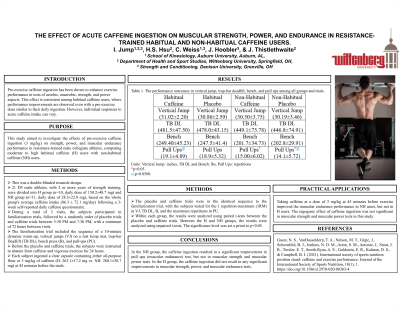Nutrition/Ergogenic Aids
(23) THE EFFECT OF ACUTE CAFFEINE INGESTION ON MUSCULAR STRENGTH, POWER, AND ENDURANCE IN RESISTANCE-TRAINED HABITUAL AND NON-HABITUAL CAFFEINE USERS.


Ian Jump, MA
Assistant Strength and Conditioning Coach
Denison University
Columbus, Ohio, United States- HH
Hung-Sheng Hsu, PhD, CSCS, USAW-1
Associate Professor
Wittenberg University
Springfield, Ohio, United States - CW
Cole Weiss
Student Intern
Denison University
Columbus, Ohio, United States - JH
Jonathan Hoobler
Assistant Strength and Conditioning Coach
Denison University
Lancaster, Ohio, United States - JT
John Thistlethwaite
Associate Professor
Wittenberg University
Springfield, Ohio, United States
Poster Presenter(s)
Author(s)
Background: Pre-exercise caffeine ingestion has been shown to enhance exercise performance in tests of aerobic, anaerobic, strength, and power aspects. This effect is consistent among habitual caffeine users, where performance improvements are observed even with a pre-exercise dose similar to their daily ingestion. However, individual responses to acute caffeine intake can vary.
Purpose: This study aimed to investigate the effects of pre-exercise caffeine ingestion (3 mg/kg) on strength, power, and muscular endurance performance in resistance-trained male collegiate athletes, comparing moderate to high habitual caffeine (H) users with non-habitual caffeine (NH) users.
Methods: Twenty-one D3 male athletes, with 2 or more years of strength training, were divided into H group (n=10, daily dose of 150.2±48.7 mg) and NH group (n=11, daily dose of 28.3±22.0 mg), based on the whole group's average caffeine intake (86.3 ± 72.1 mg/day) following a 3-week self-reported daily caffeine questionnaire. During a total of 3 visits, the subjects participated in familiarization trials, placebo trials, and caffeine trials between 5:30 PM and 7:30 PM, with a minimum of 72 hours between visits. The familiarization trial included the sequence of a 10-minute dynamic warm-up, vertical jumps (VJ) on a Just Jump mat, trap-bar Deadlift (TB DL), bench press (B), and pull-ups (PU). Before the placebo and caffeine trials, the subjects were instructed to abstain from caffeine and vigorous exercise for 24 hours. The order of the placebo and caffeine trials was randomly and double-blinded assigned, with each subject ingesting a clear capsule containing either all-purpose flour or 3 mg/kg of caffeine (H: 263.1±17.2 mg vs. NH: 260.1±30.7 mg) at 45 minutes before the trials. The placebo and caffeine trials were in the identical sequence to the familiarization trial, with the subjects tested for the 1 repetition-maximum (1RM) in VJ, TB DL, B, and the maximum repetitions in PU. Within each group, the results were analyzed using paired t-tests between the placebo and caffeine trials. Between the H and NH groups, the results were analyzed using unpaired t-tests. The significance level was set a priori to p< 0.05.
Results: Table 1 presents the test results in VJ, TB DL, B, and PU in both H and NH groups in the placebo and caffeine trials. There was not a significant difference in VJ, TB DL, and B between placebo and caffeine ingestion within each group or between H and NH groups. In the NH group, PU repetitions were significantly higher in the caffeine trial than in the placebo trials (p< 0.05). Although not reaching a significant level of difference, the H group in the caffeine trials showed a trend towards greater performance in PU compared to the NH group in the placebo trials (p=0.05), but not compared to the NH group in the caffeine trials (p=0.105).
Conclusion: In the NH group, the caffeine ingestion resulted in a significant improvement in pull-ups (muscular endurance) test, but not in muscular strength and muscular power tests. In the H group, the caffeine ingestion did not result in any significant improvements in muscular strength, power, and muscular endurance tests.
PRACTICAL APPLICATIONS: Taking caffeine at a dose of 3 mg/kg at 45 minutes before exercise improved the muscular endurance performance in NH users, but not in H users. The ergogenic effect of caffeine ingestion was not significant in muscular strength and muscular power tests in this study.
Acknowledgements: None.
